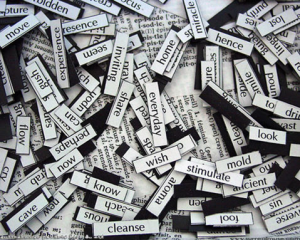By Alastair Grant
In business presentations it is normal to use PowerPoint to assist. Indeed PowerPoint also provides the crib sheet we need to keep us on track and at the end it can be taken away as a souvenir of the occasion. This default standard has drawbacks. The presenter can end up as a secondary source of information as listeners use their eyes to scan the slides. Of course good graphics, pictures and charts show information that the presenter would find hard to describe verbally. But slides filled with dense words really don’t help except when it comes to a handout. But this article is not another rant about PowerPoint; it’s simply about the importance of words.
Churchill was reputed to spend an hour for every minute of his speeches. Every word had to add value. A memorable quote was that “He mobilised the English language and sent it into battle”.
It is true that Churchill’s most inspiring words were at a time of great crisis but his ability to talk with clarity and persuasion are relevant to business presentations. Words matter.
Brevity
Most of us simply have too much to say. We might work on the principle that covering the subject in a detailed and comprehensive way shows we have command of the subject and the more we say the more will stick. This is simply not true! Some believe that if they leave stuff out then they have not been thorough. But the listener did not come along wishing to be told as much as possible!
We all face a challenge with too much information, be it email, meetings, phone calls and yes presentations. 50 years ago things were quieter. No PCs, no mobiles no photocopiers of the sort we have today. Not even an overhead projector. (There must be a large shed somewhere filled with thousands of overhead projectors.) So words faced less competition. Listeners were accustomed to using their ears as a conduit of information.
An idea I use when helping someone with a presentation is to remove the slides and summarise their ideas on one page. If I can do that then it is a sign that the message is coherent. At Staff College we used to burden our students with writing briefs on complex subjects. They had to pick out what was relevant and ruthlessly discard padding and unnecessary detail. We gave them copious amounts of information but they then had to reduce to a two page brief. This is not the same as preparing bullet points which do not tell a story and can be interpreted in varying ways. So my first idea to use words well is to summarise in succinct prose your story on one page. Of course it may stray onto a second page but as an exercise in de-cluttering your mind and being focused on what you hope your audience will be taking away it has merit and may even save you time later.
Clarity
We know that we use the Anglo-Saxon route of our language in every day conversation. If you are not sure what has a Latin or Saxon route don’t worry too much, The first 76 most used words in the English language came courtesy of the Anglo Saxons. The first Latin word at 77 is the word ‘number’. A simple trick is to use the short simple words. Stop/Start/Go/Get cut through the air better than Terminate/Initiate/Commence and Obtain. Directive = Order. Mandate = Allow. With regard to = About. As a result = So.
But we also need to speak using verbal imagery to avoid the confusion of abstraction. The amount of rubbish fly-tipped every month in London would fill Hyde Park to a height of five feet. That’s ten football stadiums if you don’t know Hyde Park! Such imagery works better than quoting tonnages or cubic metres. People also remember the detail longer as they ponder the image they had to create in their brain.
Persuasion
Words need to persuade. Of course delivery and speech writing flourishes appeal to emotions. There is not enough space to expand on that here. More simply the audience need to be persuaded of the relevance and benefits to your ideas. Facts need to be turned into benefits or the reverse, penalties, of the point that you are making.
Words Matter because we tend to use PowerPoint as the start point of preparing a presentation. The words that you speak are incidental to theme. I am certainly not suggesting Churchill’s expenditure of an hour of preparation for every minute that you speak but I am certain that if you can summarise your presentation in a page of prose that could pass muster in The FT or some other august publication, then you have given yourself an advantage. Now you just have to win the game.


